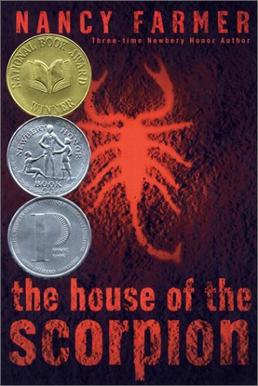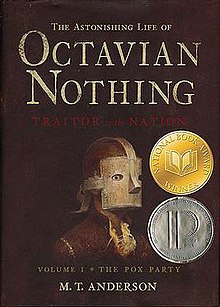
The House of the Scorpion is a 2002 science fiction young adult novel by Nancy Farmer. It is set in the future and mostly takes place in Opium, a country which separates Aztlán and the United States. The main character Matteo Alacrán, or Matt, is a young clone of a drug lord of the same name, usually called "El Patrón". It is a story about the struggle to survive as a free individual and the search for a personal identity.

Matthew Tobin Anderson, is an American writer of children's books that range from picture books to young adult novels. He won the National Book Award for Young People's Literature in 2006 for The Pox Party, the first of two "Octavian Nothing" books, which are historical novels set in Revolution-era Boston. Anderson is known for using wit and sarcasm in his stories, as well as advocating that young adults are capable of mature comprehension.

David Almond is a British author who has written many novels for children and young adults from 1998, each one receiving critical acclaim.

Candlewick Press, established in 1992 and located in Somerville, Massachusetts, is part of the Walker Books group. The logo depicting a bear carrying a candle is based on Walker Books's original logo.

Monster, published April 21, 1999 by HarperCollins, is a young adult drama novel by American author Walter Dean Myers. It was nominated for the 1999 National Book Award for Young People's Literature, won the Michael L. Printz Award in 2000, and was named a Coretta Scott King Award Honor the same year.

Walter Dean Myers was an American writer of children's books best known for young adult literature. He was born in Martinsburg, West Virginia, but was raised in Harlem. A tough childhood led him to writing and his school teachers would encourage him in this habit as a way to express himself. He wrote more than one hundred books including picture books and nonfiction. He won the Coretta Scott King Award for African-American authors five times. His 1988 novel Fallen Angels is one of the books most frequently challenged in the U.S. because of its adult language and its realistic depiction of the Vietnam War.
Marcus Sedgwick was a British writer and illustrator. He authored several young adult and children's books and picture books, a work of nonfiction and several novels for adults, and illustrated a collection of myths and a book of folk tales for adults. According to School Library Journal his "most acclaimed titles" were those for young adults.
Leonard Black was born a slave in Anne Arundel County, Maryland, and was separated from his family by the age of six. He escaped after 20 years of slavery. In 1847 he wrote The Life and Sufferings of Leonard Black: A Fugitive from Slavery. With encouragement and support, he became a Baptist minister, preaching in Boston, Providence, and Nantucket before becoming minister of First Baptist Church in Petersburg, Virginia.

A house slave was a slave who worked, and often lived, in the house of the slave-owner, performing domestic labor. House slaves performed essentially the same duties as all domestic workers throughout history, such as cooking, cleaning, serving meals, and caring for children; however, their slave status could expose them to more significant abuses, including physical punishments and use as a sexual slave.

Nation is a novel by Terry Pratchett, published in the UK on 11 September 2008 and in the US on 6 October 2009. It was the first non-Discworld Pratchett novel since Johnny and the Bomb (1996). Nation is a low fantasy set in an alternative history of our world in the 1860s. The book received recognition as a Michael L. Printz Honor Book for 2009.

Candlewick or Lampwick is a fictional character who appears in Carlo Collodi's 1883 book The Adventures of Pinocchio.

Bethany Veney, was an American writer whose autobiography and slave narrative, Aunt Betty's Story: The Narrative of Bethany Veney, A Slave Woman, was published in 1889. Born into slavery on a farm near Luray, Virginia, as Bethany Johnson, married twice, first to an enslaved man, Jerry Fickland, with whom she had a daughter, Charlotte. He was sold away from her and she later married Frank Veney, a free black man. She was sold on an auction block to her enslaver, George J. Adams, who brought her to Providence, Rhode Island, and later to Worcester, Massachusetts. After the American Civil War, Veney made four trips to Virginia to move her daughter and her family and 16 additional family members north to New England.

The Astonishing Life of Octavian Nothing, Traitor to the Nation, Volume II: The Kingdom on the Waves (2008) is a historical novel written for young adults by M. T. Anderson and published by Candlewick in 2008, and a sequel to Volume I: The Pox Party (2006). The American Library Association named it a Printz Honor Book, one of four runners-up for the annual Michael L. Printz Award recognizing literary excellence in books for young adults.
"A Pox on Our House" is the seventh episode of the seventh season of the American medical drama House. It aired on November 15, 2010.
Helen Marie Frost is an American writer and poet. She is best known for the young-adult novel Keesha's House, which was a Michael L. Printz Award honor book in 2004.

Chains, written by Laurie Halse Anderson, is the first novel in the Seeds of America trilogy, a series of young-adult historical novels, first published in the United States on October 21, 2008. The trilogy follows the story of Isabel, a teenaged African-American slave striving for and her younger sister's freedom during the American Revolutionary War. Chains takes place mainly in New York City in 1776 into 1777, at a time when slavery was legal and common in the Thirteen Colonies. The book is followed by sequels Forge (2010) and Ashes (2016). This book is also the subject of Academic Pentathlon's 2022-2023 Literature curriculum as one of the main works.
Onesimus was an African man who was instrumental in the mitigation of the impact of a smallpox outbreak in Boston, Massachusetts. His birth name is unknown. He was enslaved and, in 1706, was given to the New England Puritan minister Cotton Mather, who renamed him. Onesimus introduced Mather to the principle and procedure of the variolation method of inoculation to prevent the disease, which laid the foundation for the development of vaccines. After a smallpox outbreak began in Boston in 1721, Mather used this knowledge to advocate for inoculation in the population. This practice eventually spread to other colonies. In a 2016 Boston magazine survey, Onesimus was declared one of the "Best Bostonians of All Time".

The Violin Sonata in G minor, GT 2.g05; B.g5, more familiarly known as the Devil's Trill Sonata, is a work for solo violin by Giuseppe Tartini (1692–1770). It is the composer's best-known composition, notable for its technically difficult passages. A typical performance lasts 15 minutes.
The 2019 Youth Media Awards were held by the American Library Association on January 28, 2019. The awards recognize books written for children and young adults and the authors and illustrators who create them.

In 1721, Boston experienced its worst outbreak of smallpox. 5,759 people out of around 10,600 in Boston were infected and 844 were recorded to have died between April 1721 and February 1722. The outbreak motivated Puritan minister Cotton Mather and physician Zabdiel Boylston to variolate hundreds of Bostonians as part of the Thirteen Colonies' earliest experiment with public inoculation. Their efforts would inspire further research for immunizing people from smallpox, placing the Massachusetts Bay Colony at the epicenter of the Colonies' first inoculation debate and changing Western society's medical treatment of the disease. The outbreak also altered social and religious public discourse about disease, as Boston's newspapers published various pamphlets opposing and supporting the inoculation efforts.














